- Home
- Frank V. Webster
Bob Chester's Grit; Or, From Ranch to Riches Page 3
Bob Chester's Grit; Or, From Ranch to Riches Read online
Page 3
CHAPTER III
FREE AGAIN
While Bob's champion, unknown to the boy, was interesting himself in hiscause, Bob was sitting on a little iron bunk his cell contained, staringabout him as though unable to comprehend the situation.
After a few minutes he heard footsteps approaching down the corridor,and then he was suddenly aroused from his reverie by a voice exclaiming:
"Well, kid, you came near making a good-sized bit of money."
"I don't call a dollar a very large sum," retorted Bob.
"A dollar? What do you mean?" exclaimed one of the two men whom Bobbeheld standing outside the cell door, staring at him through the bars."You had seven hundred and fifty dollars of that countryman's money,didn't you?"
"I saw seven hundred and fifty dollars of his money put in the envelope,but all I was to get for holding the envelope until those bad menreturned was to be one dollar--and they didn't even come back to pay me,and now I haven't delivered the groceries, and Mr. Dardus will be veryangry."
"Oh, ho! So you are Len Dardus' kid, are you?" queried the other ofBob's inquisitors.
"I'm not his kid, but he is my guardian," corrected the lad in a voiceso full of reproach that the two men could not refrain from smiling.
"Then you don't like Dardus?" smiled the one who had addressed himfirst.
"I think he is unreasonable," returned Bob.
"Yes, and none too honest," commented the other.
With the various methods known only to the police detectives of thelarge metropolitan police forces, the two men put Bob through a grillingexamination, trying in every possible way to scare him into admittingeither a knowledge of who the swindlers were, or of direct complicity inthe confidence game, but without being able to shake his story, even inthe slightest detail.
Loath as the police officials were to admit Bob's innocence, hisstraightforward answers and manly manner finally convinced them that hewas, as he had said, entirely guiltless, and they withdrew.
As they returned to the outer room of the police station, the sergeantlooked at them questioningly.
"That boy had nothing to do with the swindle," announced one of the menwho had been examining Bob.
"That's what," confirmed the other. "If there ever was an honest boy inNew York, that poor little chap back in the cell is one. If you take myadvice, sergeant, you will let him go, and you will change the entry onyour police book from 'Arrested and Held for Complicity,' to 'Held forExamination'."
"What's the matter with all you guys, anyway?" snarled the sergeant, ashe saw that the weight of opinion was against him. "Has the boyhypnotized you? It's enough to convict him that he should be working forLen Dardus."
"That isn't his fault," returned the officer who had advised thesergeant to change the entry in his book. "His mother and father diedwhen he was three years old, and his father provided in his will thatDardus should be his guardian, though from what the boy has told us, hehasn't had any too happy a time of it, poor little shaver."
"Now don't go turning on the sympathy," growled the sergeant. "I don'tcare whether the boy is guilty or not. All I know is that we have got tomake a case against him. It would never do to have it said that twosharpers could rob a countryman in broad daylight in our precinct.Haven't our reports to headquarters said, and haven't the papers said,that our precinct has been free from all such crimes for more than sixmonths, and this is one of the rawest swindles that has been worked fora long time. So you two get busy and fix up your case if you want tostay in this precinct. If you don't, I'll tell the captain and theinspector, and you will be sorry."
Without response, the two officers, who believed in Bob's innocence,turned on their heels, and started toward the door of the policestation.
"Hey, you two! Go down to the court. I am going to send this boy rightdown, and mind you remember what I told you," shouted the sergeant. And,suiting his action to his words, he gave orders for Bob to be broughtfrom his cell and taken to the police court.
Just as Bob appeared in the outer room of the station house, Fosterentered.
As he saw the boy whose cause he had espoused, the reporter exclaimed:
"So you have decided to release him, have you, sergeant?"
"Release nothing," growled the official. "He's on his way to court," andthen, as he had read from the expression on Foster's face that hismission to interview Len Dardus had not been altogether satisfactory,he continued: "You found I was pretty near right about old Dardus,didn't you?"
"He surely isn't a very agreeable person," answered the reporter, "and Iquite agree with you that if there was money enough in the undertaking,he would never stop to question whether or not it was against the law.But I tell you one thing, sergeant, you are dead wrong about the boy.The old man actually hates him."
"Then it would be an easy way for him to get rid of the kid by gettinghim into just this kind of a mess."
"Maybe you're right," assented Foster, as this theory was announced,"still I don't believe you are. I am more convinced than ever that theboy had nothing to do with the swindle, and I don't think old Dardusdid, either."
"Well, it won't help matters to keep arguing about it here. We'll letthe judge decide. McCarty, call a patrol wagon, and take the kid tocourt."
"Oh, I say! you are surely not going to make that kid ride in the patrolwagon?" protested one of the other newspaper men. "That would be rubbingit in too hard."
Emphatically the others added their protest, and in the face of suchopposition, the sergeant countermanded his order for the police wagon,and instead instructed Patrolman McCarty to take the boy to court,which was less than two blocks away.
Surrounded by the reporters, Bob and the patrolman walked down thestreet, closely followed by the countryman, whose desire to make moneywithout working for it had led to the loss of the seven hundred andfifty dollars.
Arrived at the building in which the court was located, Bob was led awayto the detention room, to await the calling of his case, while thereporters and Simpkins made their way direct to the court room.
In due course the case was reached.
When the presiding magistrate caught sight of Bob's sad face, the sternexpression on his own countenance relaxed, and he bestowed upon thetrembling boy a glance full of encouragement.
Noting this, Foster, who had been watching the judge intently, wasinspired with the hope that the boy would be quickly discharged. But hispleasure was only momentary, for, as the magistrate read the charge, hisface became even more austere than usual.
"Well, Chester, what have you to say for yourself?" demanded the judge,directing a glance at the boy, as though he would pierce his very soul."Are you guilty, or not guilty?"
"WELL CHESTER, WHAT HAVE YOU TO SAY FOR YOURSELF?"_Bob Chester's Grit_ Page 24]
The strangeness of the scene and lack of familiarity with theprocedure of a court caused Bob to remain silent.
Again the magistrate repeated his question, but still Bob made no reply.
"I think he wants to plead guilty," interposed one of the plain-clothesmen whom the sergeant had ordered to make a case against the boy."Perhaps if you offered to give him a light sentence if he would tell uswho the two men are who got away with the money, he would do so."
"How about that?" demanded the magistrate, again directing his gaze atthe boy.
But before Bob had a chance to reply, Foster exclaimed:
"He does not want to plead guilty, your honor. This whole business indragging this boy to court is an outrage. He had no more knowledge ofthe fact that those men intended to, or were, swindling this man fromthe country, than you have."
The tone in which the reporter spoke was one that could not fail to beimpressive, and after a moment's hesitation, the magistrate, who knewFoster as a reporter and admired him for his manly fearlessness, asked:
"What do you know about the case?"
"I protest, your honor, that this man should not be allowed to interferewith the case," said one of the plai
n-clothes officers. "He was not awitness of the transaction. I think it would be more proper to hearSimpkins' version of the affair."
"When I wish your advice, officer, I will ask for it," snapped themagistrate, and turning again to Foster, he said:
"Tell me all you know about this business."
"Thank you, your honor, I will:
"I happened to be in the police station when the boy was brought in. Hetold a straightforward story about having been on the way to deliversome groceries, when he was hailed by one of three men, who asked him afew questions, and then offered him a dollar if he would hold anenvelope, which was supposed to contain twelve hundred and fiftydollars, for a few minutes. The thought of earning such a sum of moneyso easily evidently caused the boy to forget all discretion. But as theminutes went by and the two men did not reappear, the boy grew restless,and finally suggested that he hand the envelope to Officer McCarty here,and that he be allowed to go about his errand of delivering thegroceries. Then----"
Interrupting, the magistrate turned to Simpkins, and demanded suddenly:
"Is that true?"
The question was so unexpected that the countryman was surprised intoanswering truthfully, and replied:
"Yes, sir."
Realizing that the turn of affairs was making them appear ridiculous,the officer who had suggested that Bob be allowed to plead guilty, andreceive a light sentence, if he would divulge the name of the twoswindlers, hurriedly exclaimed:
"But the boy has a bad record, your honor."
"That is not so, your honor," retorted Foster hotly. "When I found thatthe sergeant was determined to hold the boy, I went to the man for whomhe works--his name is Len Dardus--and made inquiries about him. Mr.Dardus is his guardian, and though it was evident that he had no lovefor the boy, the worst he could say about him was that he took a halfhour to deliver an order that should have been delivered in twentyminutes. As to his associating with bad companions, that is not so, forhis guardian said he was never out at night, always preferring to read."
"If the boy is such a paragon of virtue, why didn't his guardian come tocourt himself and try to help the boy, instead of leaving it to areporter?" sneered the officer who was trying so hard to make a caseagainst Bob.
"I tried to get him to come," exclaimed Foster, "but he refused on theground that he could not leave his store."
"You reporters are certainly good ones at putting up a plausible story,"retorted the officer contemptuously.
Striking his desk a sharp rap with his gavel, the magistrate exclaimed:
"When I want to hear from you, sir, I will let you know. You would makea far better impression if you and the sergeant and every otheravailable man connected with the precinct were out searching for the twoswindlers, instead of trying to send a poor, almost friendless, lad toprison. If you arrested half as many criminals as you do innocent men,it wouldn't take long to rid this city of crime."
So stinging was this rebuke that the reporters were busy writing downthe words of the judge, and before they had finished, the magistratesaid:
"Does your guardian treat you well, Bob?"
"Why, sir, I suppose so, sir; but he scolds me a lot. He seems to thinkthat every time he sends me out to deliver an order, that I should comeback within a quarter of an hour, no matter whether I have to go oneblock or twenty."
"How much does he pay you?"
"Two dollars a week, sir."
"What do you read at night?"
"About farming and ranching out West, sir."
"Then you want to go out West?"
"Yes, sir. I'm going just as soon as I have money enough. I have savedten dollars already towards going."
"Huh! What becomes of your charge that the boy has evil associates, Mr.Officer?" snapped the magistrate, as he heard Bob's reply. "Any boy whoearns two dollars a week, and has managed to save ten, surely can't haveany bad habits.
"Bob, you are discharged. The disgrace to which you have been subjectedof being arrested and brought to court is an outrage, and I wish therewas some way that you could obtain redress from the officers whosubjected you to it, but unfortunately there is not."
Reaching into his pocket, the magistrate drew forth some bills, fromwhich he selected one of the denomination of five dollars, and handed itto Bob.
"Put this with your ten dollars," he continued. "It will help sometoward getting you out West, and now you go back to Mr. Dardus, and tellhim that Judge Bristol said that your arrest was an outrage. Clerk, callthe next case."
If Bob had been bewildered by the circumstances that had led to hisbeing brought to court, he was still more so with the sudden turn inevents that had resulted in his release, and it was not until one ofthe court attaches good-naturedly advised him to leave the court room assoon as he could, that he realized he was again free.
But in his haste to obey, he suddenly remembered the reporter whoseinterest in him had been of such assistance, and he stopped and lookedabout the courtroom for him. But Foster and the other reporters werebusy telephoning the story to their papers, and repeating themagistrate's scathing rebuke to the police of the precinct and the city,so that Bob could not see them. And, after lingering a moment or so, hefinally decided to return to his guardian without more delay, promisinghimself that he would search out his champion and thank him anothertime.

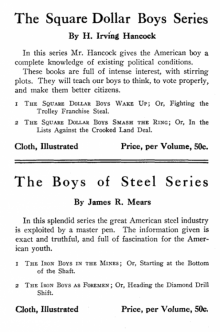 The Iron Boys in the Mines; or, Starting at the Bottom of the Shaft
The Iron Boys in the Mines; or, Starting at the Bottom of the Shaft Two Boy Gold Miners; Or, Lost in the Mountains
Two Boy Gold Miners; Or, Lost in the Mountains The Boys of Bellwood School; Or, Frank Jordan's Triumph
The Boys of Bellwood School; Or, Frank Jordan's Triumph Book of Cheerful Cats and Other Animated Animals
Book of Cheerful Cats and Other Animated Animals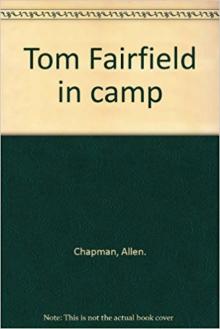 Ralph of the Roundhouse; Or, Bound to Become a Railroad Man
Ralph of the Roundhouse; Or, Bound to Become a Railroad Man Jack of the Pony Express; Or, The Young Rider of the Mountain Trails
Jack of the Pony Express; Or, The Young Rider of the Mountain Trails The Young Firemen of Lakeville; Or, Herbert Dare's Pluck
The Young Firemen of Lakeville; Or, Herbert Dare's Pluck Boy Scouts of Lenox; Or, The Hike Over Big Bear Mountain
Boy Scouts of Lenox; Or, The Hike Over Big Bear Mountain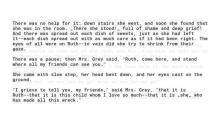 Book of One Syllable
Book of One Syllable Air Ship Boys : Or, the Quest of the Aztec Treasure
Air Ship Boys : Or, the Quest of the Aztec Treasure Boy Pilot of the Lakes; Or, Nat Morton's Perils
Boy Pilot of the Lakes; Or, Nat Morton's Perils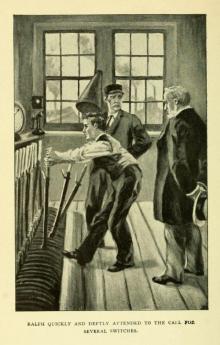 Ralph in the Switch Tower; Or, Clearing the Track
Ralph in the Switch Tower; Or, Clearing the Track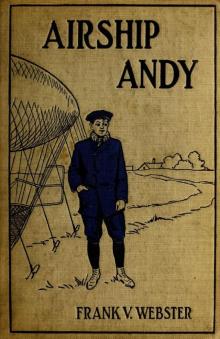 Airship Andy; Or, The Luck of a Brave Boy
Airship Andy; Or, The Luck of a Brave Boy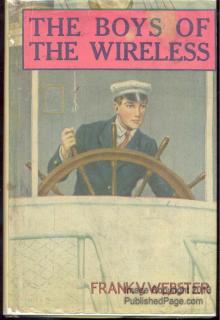 Boys of the Wireless; Or, A Stirring Rescue from the Deep
Boys of the Wireless; Or, A Stirring Rescue from the Deep Alfgar the Dane or the Second Chronicle of Aescendune
Alfgar the Dane or the Second Chronicle of Aescendune Boy Knight
Boy Knight Boy Ranchers Among the Indians; Or, Trailing the Yaquis
Boy Ranchers Among the Indians; Or, Trailing the Yaquis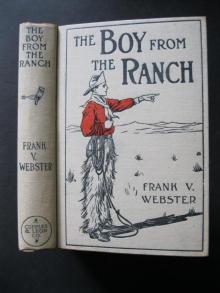 Boy from the Ranch; Or, Roy Bradner's City Experiences
Boy from the Ranch; Or, Roy Bradner's City Experiences Boy Ranchers in Death Valley; Or, Diamond X and the Poison Mystery
Boy Ranchers in Death Valley; Or, Diamond X and the Poison Mystery Boy Ranchers on the Trail; Or, The Diamond X After Cattle Rustlers
Boy Ranchers on the Trail; Or, The Diamond X After Cattle Rustlers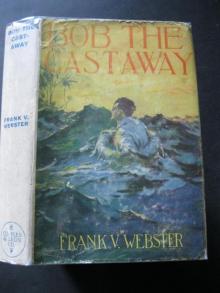 Bob the Castaway; Or, The Wreck of the Eagle
Bob the Castaway; Or, The Wreck of the Eagle Boy Ranchers in Camp; Or, The Water Fight at Diamond X
Boy Ranchers in Camp; Or, The Water Fight at Diamond X Boy Ranchers; Or, Solving the Mystery at Diamond X
Boy Ranchers; Or, Solving the Mystery at Diamond X Boy's Ride
Boy's Ride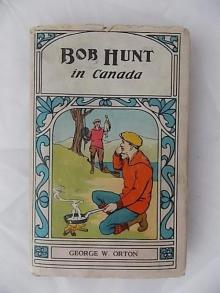 Bob Hunt in Canada
Bob Hunt in Canada Boy Ranchers on Roaring River; Or, Diamond X and the Chinese Smugglers
Boy Ranchers on Roaring River; Or, Diamond X and the Chinese Smugglers Alida; or, Miscellaneous Sketches of Incidents During the Late American War.
Alida; or, Miscellaneous Sketches of Incidents During the Late American War.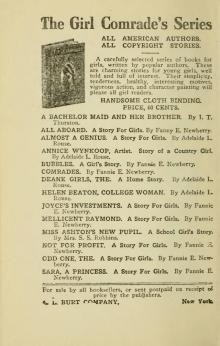 All Aboard: A Story for Girls
All Aboard: A Story for Girls Bob Chester's Grit; Or, From Ranch to Riches
Bob Chester's Grit; Or, From Ranch to Riches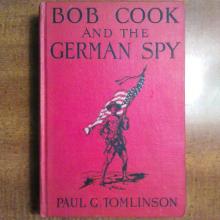 Bob Cook and the German Spy
Bob Cook and the German Spy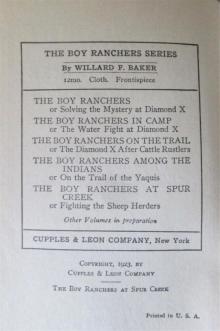 Boy Ranchers at Spur Creek; Or, Fighting the Sheep Herders
Boy Ranchers at Spur Creek; Or, Fighting the Sheep Herders